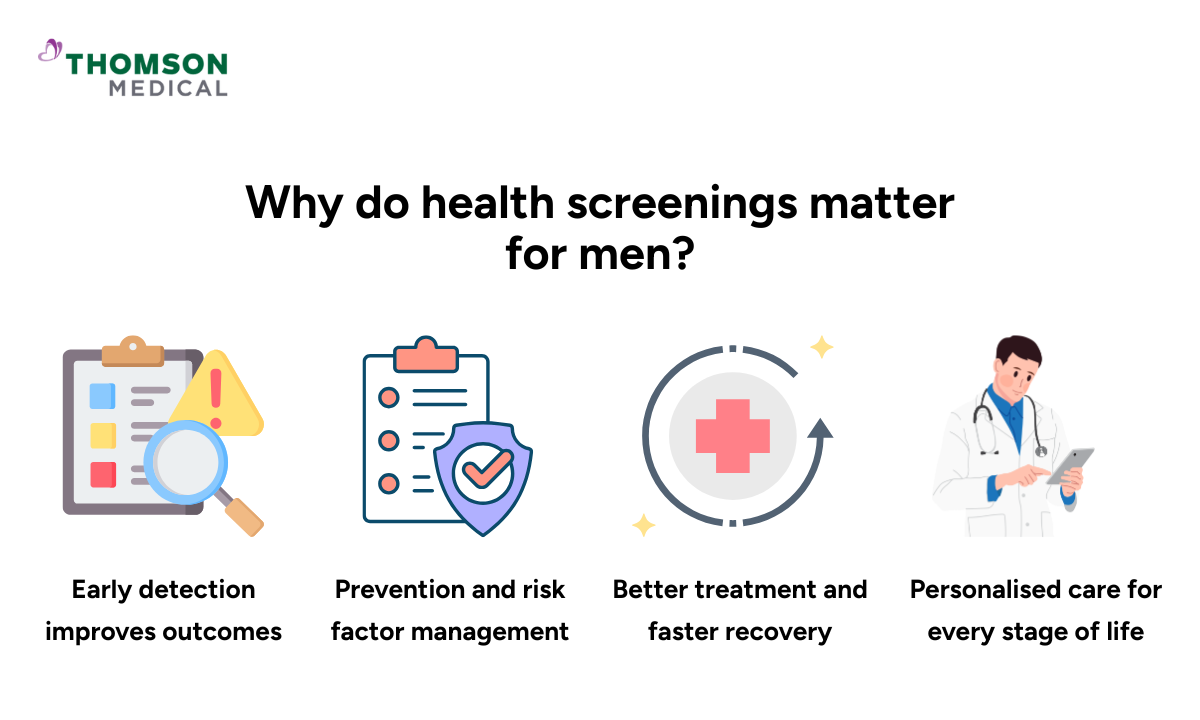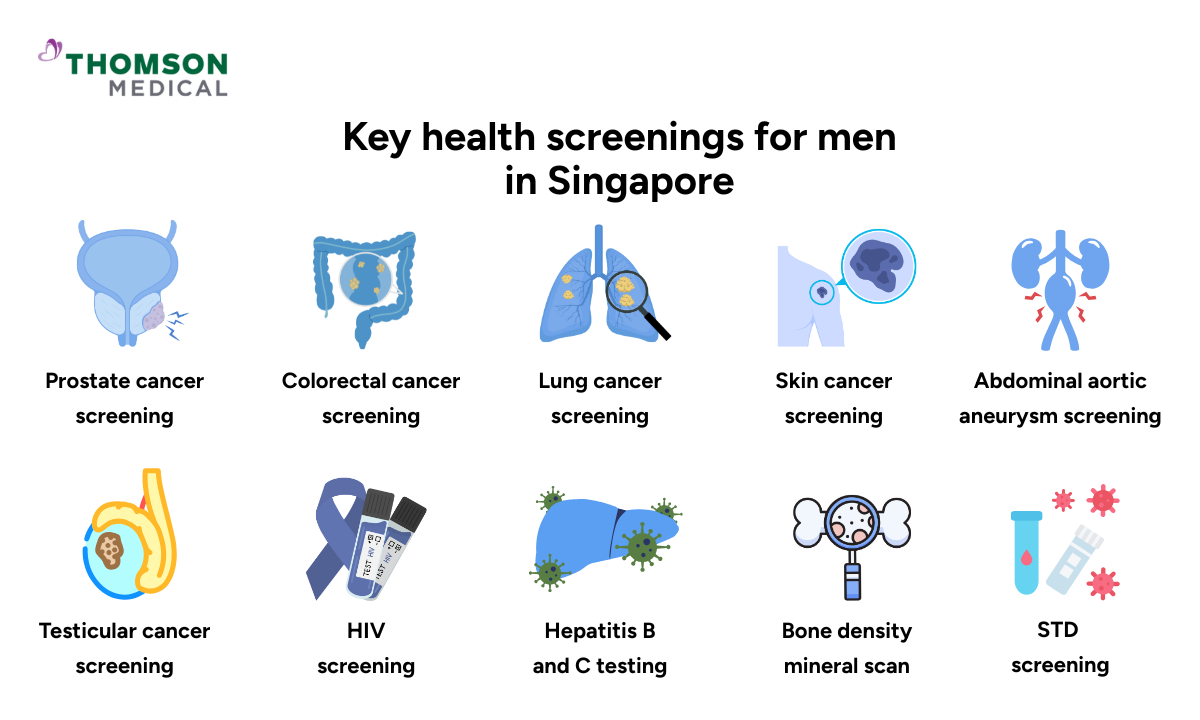What are health screenings for men?
Health screenings are medical tests that help detect health conditions before any symptoms appear. Men need screenings to identify potential serious health problems early, particularly with men's health issues, such as heart disease, diabetes, and cancer.
Early identification of a serious health problem speeds up and often simplifies the treatment you need.
Why do health screenings matter for men?

Health screenings are an important part of staying well, especially for men as they get older and face a higher risk of certain long-term health conditions. These routine checks are designed to pick up on potential problems—like heart disease, diabetes, or cancer—early on, often before any noticeable symptoms appear. Detecting these issues early means treatment can begin sooner, often making it more effective and less intensive.
Making time for regular screenings is a practical way for men to take charge of their health. It helps maintain energy, physical function, and independence over the years. More than just preventing illness, it’s about preserving your quality of life and giving yourself the best chance to stay well and active for as long as possible.
Key health screenings for men in Singapore

Here are some of the most important health screenings every man should know about:
Prostate cancer screening
Prostate cancer is one of the most common cancers in men, particularly for those who are 50 and over. Many types of prostate cancer grow slowly in most men; however, early diagnosis and detection will allow for an easier and less invasive treatment. Here is a list of prostate cancer screening tests that may be offered:
PSA blood test:
Measures prostate-specific antigen levels. Elevated PSA may suggest cancer but can also result from benign conditions.
Digital rectal exam (DRE):
A brief physical exam to detect lumps or firmness in the prostate.
Imaging may be used to assess prostate structure when further evaluation is needed.
Who should get screened:
Men aged 50–70 with average risk.
Men aged 40–45 with a family history or increased risk.
Testicular cancer screening
Testicular cancer is less common than other cancers but primarily affects younger men, particularly those between the ages of 15 and 40. It often presents as a painless lump or swelling in one testicle. When detected early, testicular cancer is highly treatable. Some of the testicular cancer screening methods that may be recommended include:
Testicular self-examination (TSE):
A simple monthly self-check to feel for any lumps, swelling, or changes in the size or shape of the testicles. This is best done after a warm shower when the scrotum is relaxed.
Physical examination by a doctor:
A clinician may examine the testicles during a routine check-up to detect any abnormalities.
Scrotal ultrasound:
Imaging may be used if a lump is found to determine whether it is solid (more likely cancerous) or fluid-filled (more likely benign).
Who should get screened:
Men aged 15–40, particularly those with a history of undescended testicles or a family history of testicular cancer.
Any man who notices changes in the testicles, such as a lump, pain, or swelling, should consult a doctor promptly.
Other cancer screenings for men
An early diagnosis of cancer greatly improves the chances of successful treatment outcomes. Recommended cancer screenings for men include:
Colorectal cancer:
Colonoscopy every 10 years from age 45, or annual stool tests as an alternative.
Lung cancer:
Annual low-dose CT scans for current or former smokers aged 50–80.
Skin cancer:
Yearly skin checks, especially for those with fair skin or high sun exposure.
Cancer markers:
Selected tests such as PSA (for prostate) or CEA (for colorectal) may be included, depending on age, family history, and risk profile.
A multi-cancer blood test can help detect signals associated with up to 50 types of cancer in men. Explore the full list of cancer screenings and request an appointment with us to find out if this test is right for you.
HIV screening
HIV testing is recommended for all individuals aged 13-64 at least once during their lifetime for better reproductive health. However, it is also recommended to get tested at least once a year if you have risk factors such as:
Multiple sexual partners
Having sex with other men
Unprotected sex or history of STDs
Intravenous drug use
Early diagnosis enables effective treatment and helps prevent transmission.
Additional screening tests for men
Depending on your age, your lifestyle, and your or your family's medical history, your doctor might recommend the following screenings to support early detection and prevention of disease:
Hepatitis B and C testing:
Recommended especially for men with risk factors such as a history of blood transfusions, liver disease, unprotected sex, or intravenous drug use. Early detection is vital to prevent long-term liver damage, including cirrhosis and liver cancer.
Physical examination and blood tests:
A general check-up that includes measurements such as BMI, blood pressure, and tests for cholesterol, glucose, liver and kidney function.
Bone density scans:
Bone density scans for assessing bone health are usually for men over 70 or younger men with a history of fractures, low testosterone, or long-term steroid use.
Cardiovascular assessments:
May include ECG or treadmill stress tests to evaluate heart rhythm and function.
Imaging studies:
Chest X-rays and abdominal ultrasounds may be used to assess internal organs and detect abnormalities not visible through physical examination.
Hormonal and micronutrient tests:
May include testosterone levels, vitamin D, and thyroid function assessments, especially when symptoms of deficiency or imbalance are present.
Abdominal aortic aneurysm screening:
Suitable for men aged 65–75 who have smoked, to check for enlargement of the main artery in the abdomen.
Stool occult blood test (FOBT/FIT):
Typically recommended from age 45 onwards, it helps check for hidden blood in the stool, which may be an early sign of colorectal cancer or other gastrointestinal conditions.
STD screenings:
Personalised based on sexual activity, number of partners, and risk profile.
Have a health concern in mind? Request an appointment with us for a personalised health screening plan based on your age, lifestyle, and health history.
Choose the right health screening for you
Health screening services for men vary based on age groups and medical factors.
Available screening services by age group:
Men aged before 30:
General physical examination and blood tests
HIV screening
Testicular cancer awareness and self-examination
Men aged 30-39:
Blood pressure measurement
Cholesterol testing
Diabetes screening
Testicular cancer awareness and self-examination
Men aged 40 and above:
Blood pressure measurement
Cholesterol testing
Diabetes screening
Prostate cancer screening
Colorectal cancer screening
Cardiovascular disease risk factor assessment
Additional screening services available:
Imaging studies
Mental health assessments
Cardiovascular evaluations
STD screenings
Screening frequency and additional tests may be determined by physicians based on individual medical history, family medical history, and lifestyle factors.
Regular health screenings can help you monitor your health more effectively and support long-term wellness. Request an appointment to understand which screening tests are most appropriate for you.
FAQ
Why do men and women have different health screening tests?
Men and women receive different health screenings based on their biology, hormones, and risk of developing diseases. For example, men receive prostate and testicular cancer screenings, while women need cervical and breast cancer screenings based on their biology and hormone levels.
In addition, testosterone affects men’s heart and cholesterol health, whereas women are at higher risk for osteoporosis and some cancers after menopause. Similarly, while men may be affected by heart disease earlier in life, women may be more affected by autoimmune disorders. Their differences make gender-specific screening a tool for prevention and early discovery.
When should a man start having health checks?
Men should begin getting regular health check-ups at age 40, when the chances of developing illnesses such as high blood pressure, heart disease, diabetes, and some cancers begin to increase. By having yearly screenings, potential health problems may be detected earlier, allowing for intervention sooner and possibly better long-term outcomes.
When should a man get his prostate checked?
The suggested ages for prostate cancer screening are based on personal risk factors:
Age 50 for men at average risk
Age 45 for men at high risk (i.e., family history or African descent)
Age 40 for men with a strong family history (e.g., multiple close relatives diagnosed with prostate cancer)
It is recommended that you speak to a health professional to determine your personal risk and screenings for prostate cancer.
What tests do men need after 40?
After the age of 40, men should consider a comprehensive range of health screenings to support early detection and disease prevention:
General health assessment:
Includes body mass index (BMI), full blood count (FBC), urine analysis (UFEME), and basic blood tests.
Cardiovascular health screening:
Checks blood pressure, fasting blood glucose, and cholesterol levels, and may include an electrocardiogram (ECG) to assess heart function.
Cancer screening:
Covers colorectal cancer (via faecal immunochemical test or colonoscopy) and prostate cancer (via PSA blood test and prostate ultrasound).
Liver and kidney function tests:
To assess organ health and detect early signs of damage like liver and kidney failure.
Thyroid function test:
Especially if symptoms of hormonal imbalance are present.
Bone and joint health:
Bone mineral density (DEXA scan) tests can help detect early signs of osteoporosis or bone loss.
Vision and hearing assessment:
Regular eye and hearing tests to monitor age-related changes.
Mental health screening:
To evaluate signs of stress, anxiety, or depression, which may increase with age.
What are the major health risks for men?
Heart disease:
The leading cause of death, linked to high blood pressure, high cholesterol, smoking, and poor diet.
Cancer:
Includes prostate (most common), lung (often smoking-related), and colorectal (rising after age 45).
Diabetes:
Often develops silently and can cause serious complications if left unmanaged.
Mental health issues:
Depression, suicide, and substance use are frequently underdiagnosed in men.
Liver disease:
Commonly caused by alcohol use or hepatitis infections.
Accidents and injuries:
More prevalent in men due to high-risk jobs and behaviours.
Stroke:
Risk increases with age, especially with uncontrolled hypertension and poor lifestyle habits.
Obesity:
A major contributor to various chronic diseases.
Chronic respiratory diseases:
Such as COPD, especially in current or former smokers.
What age should men get cancer screening?
Men should start cancer screening around age 40 to 50, depending on their risk factors and the type of cancer. It's best to consult a doctor for personalised recommendations.
At what age should a man start getting a colonoscopy?
Men at average risk should begin colorectal cancer screenings at age 45. Those with a family history of colorectal cancer may need to start earlier, as advised by their doctor.
The information provided is intended for general guidance only and should not be considered medical advice. For personalised recommendations and tailored advice, please consult a specialist at Thomson Medical. Request an appointment with Thomson Medical today.
For more information, contact us:
Thomson Specialists Paragon (Health Screening)
- Mon - Fri: 8.30am - 5.30pm
- Sat: 8.30am - 12.30pm
Call: 6735 0300
See Health Screening Packages
Notice:
The range of services and tests may vary. Please contact us directly to enquire about the current availability.
Book Health Screening